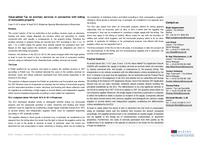
Value-added Tax on ancillary services in connection with letting of immovable property
Problem
The current opinion of the tax authorities is that ancillary services (such as electricity, heating and water, refuse disposal) are services which are secondary to, closely connected with, and, usually, a consequence of, the property letting. Therefore the ancillary services to property letting are exempt from VAT according to Sec. 4 no. 12 sent. 1 lit. a UStG unless the parties have actively waived the exemption from VAT. Based on this legal opinion the landlord’s value-added tax obligations are minor in connection with letting out property.
However, the decision of the ECJ (C-42/14) will cause changes within this legal opinion at least in case the tenant is free to determine his own level of consumed ancillary services using an individual meter. Basically these ancillary services are taxable.
The Case
A Polish landlord let out property and opted to subject the ancillary services to VAT according to Polish Law. The landlord itemized the costs of the ancillary services for electricity, water and refuse collection purchased from third parties separately in the invoices to the tenant.
The question of dispute between the Polish tax authorities and the landlord was whether the VAT Directive must be interpreted as meaning that the letting of immovable property and the associated provision of water, electricity and heating and refuse collection must be regarded as constituting a single supply or several distinct and independent supplies which must be assessed separately according to value-added tax regulations.
ECJ: Judgment dated 16th April. 2015 (C-42/14 Wojskowa)
The ECJ developed detailed criteria to distinguish whether letting out immovable property and the associated provision of water, electricity and heating and refuse collection must be regarded as constituting a single supply (basically exempt from VAT) or several distinct and independent supplies which must be assessed separately according to VAT (basically taxable).
The supplies relating to those goods or services may, in principle, be considered to be separate from the letting when the tenant has the right to choose his suppliers and/or the terms of use of the goods or services at issue. In particular, when the tenant can determine his own consumption of water, electricity or heating, which can be verified by the installation of individual meters and billed according to their consumption, supplies relating to those goods or services may, in principle, be considered to be separate from the letting.
The ECJ also stated that when an immovable property offered for letting appears objectively, from an economic point of view, to form a whole with the supplies that accompany it, they can be considered to constitute a single supply with the letting. The same may apply to the letting of turnkey offices, ready for use with the provision of utilities and certain other supplies, and the immovable property which is let for short periods, in particular for holidays or for professional reasons, and offered with those supplies, which are not separable from it. The final conclusion of the ECJ is that in all cases, it is necessary to take into account all the circumstances of the letting and the accompanying supplies and in particular, the content of the agreement itself.
Practical Guidance
As stated above Sec. 4.12.1 para. 5 sent. 3 of the Value Added Tax Application Decree (UStAE) still considers the supply of ancillary services as services which are secondary to, closely connected with, and usually, a consequence of, the property letting. This interpretation is not entirely consistent with the differentiation criteria established by the ECJ. It remains to be seen how the legislature, the tax authorities and the Federal Fiscal Court respond to the judgement of the ECJ and whether the tax authorities will change the wording of the German VAT Application Decree. Even if the German VAT Application Decree has not yet been amended, landlords should consider directly invoking the principles established by the ECJ. The differentiation is not only significant whether or not the let is exempt from VAT. If the let is subject to VAT, the question arises which tax rate should be applied. Moreover, the single supply of electricity could lead to a situation in which the landlord is liable to taxation as recipient of the supply. Companies affected by this issue should review their services supplied and distinguish the services (single supplies or several distinct and independent supplies) considering the differentiation criteria established by the ECJ.
At least in cases where the tenant is free to determine his own level of consumption using an individual meter and the landlord then invoices the amount consumed accordingly, the supplied services have to be considered as taxable supply. Exceptions can be applied to the letting out of condominiums (condominium or apartment properties). Furthermore, the costs of services purchased from third parties by the landlord have to be assigned to the passed on services to the tenant for the calculation of input tax deduction.



